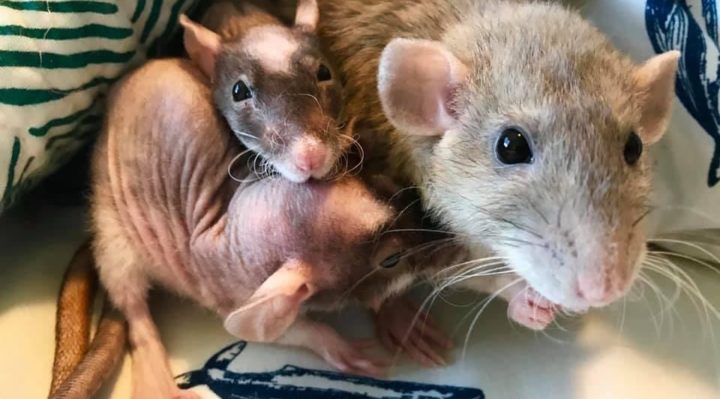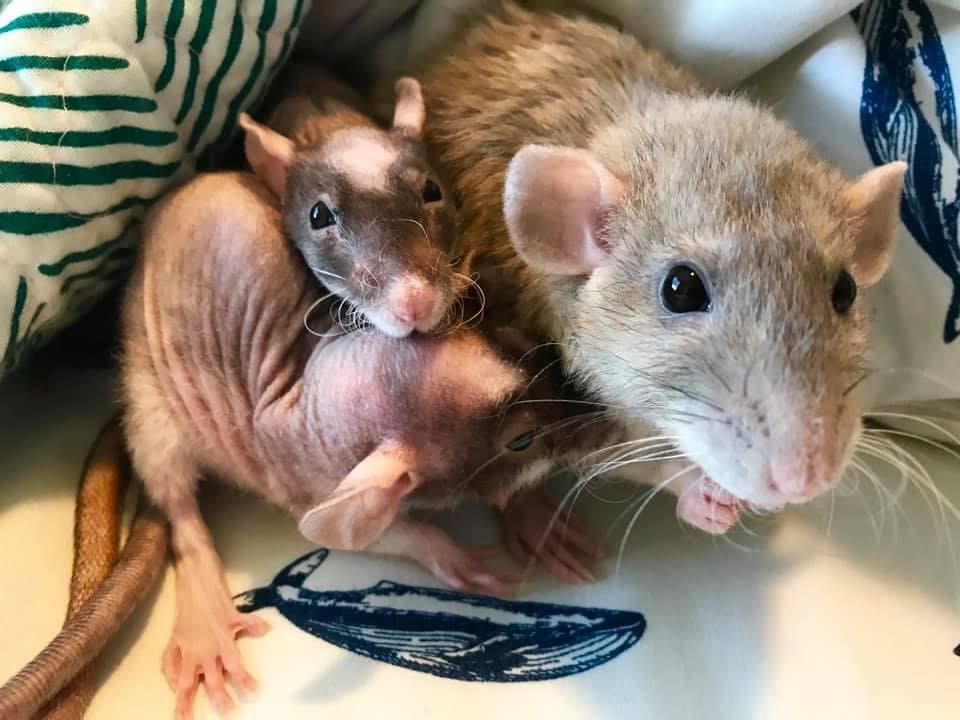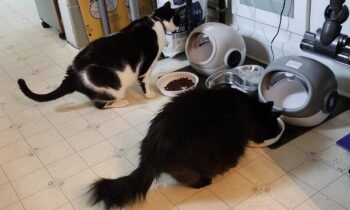
I’ve been discussing “alternative pets” with several friends lately—not cats or dogs, you understand, but “other” pets that might be a good choice as companion animals in cases where canines or felines would be too big, might need more room in housing, or could need care requiring physical abilities from their humans. The discussion has raised our curiosity about other kind of pets that might be perfect for elder humans or for young humans (with adult supervision).
We had a lot of questions about two pets that might fit the requirements—mice or rats!
I asked friends online to share their own personal experiences with rats or mice as pets—if they had them when they were young or if they have them now as adults … or if they themselves are now adults whose kids have or have had mice or rats as pets. Here are some of the questions they answered:
▪ How did you choose to adopt mice or rats?
▪ Where did you get the mice or rats you adopted?
▪ How did you learn to take care of your new pet?
▪ What veterinary care was required?
▪ What equipment did you need. Cage and … ?
▪ Did you have any bad experiences with the pet?
▪ Tell us about the good experiences you had!
▪ What surprised you most about the pet?
▪ Would you recommend mice or rats as pets—to adult friends or to parents for their children?
Sarah Adams (Oregon) YES! Ratties are wonderful pets. I would really recommend them. Especially if a parent can’t let their child have a cat or dog for whatever reason, a rat is a good compromise. I would recommend them over the other “cuter” cage pets (i.e., hamsters, gerbils). Rats are much more intelligent and likely to bond with a caretaker.
I got my first rat about a zillion years ago as a teenager. From a pet store, which isn’t really ideal, as we all now know, but it was the ’80s. Her name was Spam, and I took her with me everywhere, I had a pocket she would ride in. My parents didn’t know I had her, and when my mom found out she was mad, but she got over it. Rats are trainable, but I didn’t really train Spam except to ride in my pocket. She would come when I called her, so I could let her run around my room when we were home.
Eventually I wasn’t able to take her around with me anymore, and I was worried she’d be lonely, so I got a second rat from the pet store, who I named Jello. (My mom had gotten over the mad and was okay with getting Spam a friend.) Unfortunately, both the girls ended up getting pneumonia and passing fairly young. Rats are prone to pneumonia and also to cancer. These are the downside of rats as pets; they don’t tend to live long. They can often be treated, though. People won’t always take a cage pet to a vet, but vets can treat the common rat illnesses. When I worked for a vet in the ’90s, we occasionally saw them. There was one that needed rehoming that one of the vets ended up adopting and keeping at the practice. That was Templeton. He was a sweet rat.

Photo by Mark Cuilla
Sunni Mace (Washington) My daughter tried to raise some rats about 20 years ago. She really liked them, and we were careful to take care of them correctly. We had terrible luck with them, though, and the two or three we tried to raise at separate times all died pretty suddenly within a couple months of our having them. The person at Petco at the time who sold them to us told us that many rats were bred just to be fed to other animals, not to be healthy pets. So it was a sad experience, especially for my daughter.
Virginia Rhodes Korn (Washington) My son had a rat. It lived only about three years. It developed a huge tumor. The vet said rats are tumor factories.
Jill Gibbs (Montana) Our club got rats for [barn hunt] trials from a hobby breeder. She went about her rat breeding like a dog breeder would. She had pedigrees and everything. I don’t know about longevity.
Jacqueline Mason Munera (Florida) There absolutely are people breeding various types of rats for pets and they focus on health, longevity, and behavior. I joined a few Yahoo groups back when I got my rat Sami. I learned so much from them!
Jennifer Bristol (New York) I have hamsters! I love it. I can create the perfect, safe environment for them, something you can’t guarantee with dogs that need to deal with public environments.
Kathy Smith (North Carolina) I’ve had hamsters, the world’s meanest gerbil, and a bunch of mice and rats as pets. They were all wonderful companions. I even had one male rat neutered so he could live a happy life with his partner. I got most of my pocket pets from a pet store, but my rats came from a veterinarian friend. I read a lot of books about caring for them and asked a lot of questions.
My mouse, Sarah Elizabeth, went to college with me and lived in the dorms (she wasn’t supposed to be there, but they didn’t know). My pair of rats, Cagney and Aristotle, lived a long and healthy life together. I could call them by name, and they’d come over one at a time and get a treat from me. As a child, I trained my hamster to “stay.” No one believed me until I showed them how Nibbles would not move until I returned. Incredibly intelligent and great pets to have!
Denise O’Moore (Ireland) [I’ve had] both and LOVED them. The rats were like little puppies the way they learned and responded. It must be about 30 years now since I’ve had either. I had 26 mice and 12 rats. All had great recall and loved peanut butter and bacon. (Probably not the best treats to give them, but back then I didn’t know any better.) I got mine from a pet store and housed them in ‘leakers’—aquariums unsuitable for aquatic life due to a crack or an issue with the seal, so you could get them very reasonably from the pet stores and add a wire mesh lid. I had hamsters (standard and dwarf), gerbils, and a chipmunk, too. Used a mixture of leakers and cages depending on the individual needing them.
Carol Duncan (Texas) I had mice when I was in the 7th grade. It was for a school science project, but I kept them long after the completion of the project, in the bedroom that I shared with my sister. I remember one night when they escaped from their cage and I awoke to find one running across my face. My mother finally evicted them to the garage because she felt they were smelling up the house. I probably was not as diligent as I should have been about keeping their cages clean.
Teresa Tuttle (Texas) We had a rat as a pet. I was an adult with two children at the time. I was walking into a mall, which had a pet shop, when I saw a large white rat walking along the planters outside the entrance. I assumed it belonged in the pet store so I put my hand down, palm up, and he crawled into my hand. I took him to the pet store where I was told he did not belong to them. Many people had told them he was out there, but no one else had bothered to bring him inside. So I purchased all the stuff needed to keep a rat healthy and happy and he came to live with us. He was a fantastic pet. He loved to play and enjoyed riding around on shoulders and exploring the world.
Cynthia Gordon (Florida) We had rats as pets when my sons were teenagers. Brilliant creatures, easily trained with positive reinforcement. Even got along beautifully with my hundred-plus-pound Bullmastiff.
Micha Michlewicz (Maryland) My foster mouse, Basil, is available for adoption in the MD/DC/VA area! He’s in a 40-gallon bin with a lot of substrate to burrow through, an exercise wheel he loves to use, several hides, toys, and chews. He likes to be kept busy elsewhere when you’re doing cage maintenance, and prefers handling away from his bin. He’s trained to go into a carrier to make that easy. He’s learning to go to a target when your hands are in the bin. He’s very smart, very food motivated, and likes to hang out with you.
Amy Fumetti (Washington) I had rats, gerbils. and hamsters. Rats are smarter and more engaging than hamsters and gerbils. When I was a teenager I had a rat named Kitty Kitty and she would go everywhere with me. She’d just hang out in my pocket or on my shoulder. Even took her to the mall and on the city bus in Phoenix.
Peggy Swager (Colorado) As a kid I had rats, gerbils, hamsters, and guinea pigs. Loved guinea pigs the most. But [I’ve] known of people who got very interactive with rats and rats are smarter.
Harve Morgan (California) Love guinea pigs, best pets ever.
Caro Janmaat (The Netherlands) Yes, rats are adorable. So smart and funny. They just live [such] short [lives] and all die of cancer.
Suzanne Truex (Texas) I’ve had eight rats in my lifetime. The first was my brother’s and I took it when my brother went to college. That rat (Critter) was so sweet and very smart and I quickly became a rat lover. It wasn’t until about 25 years later that I got my two rat girls, Venous and Pons (anatomical names—that’s a whole other story). I had just lost one of my dogs from cancer and I was so sad. Going into a pet supply store, I saw the two rat girls and was afraid of the possibility of them becoming snake food, so I bought them on the spot.
The only care info I had for Critter was a book by Debbie Ducommun, who died in 2018. I later found out how knowledgeable she was and learned so much about rat health issues from her that helped me further down the rat road. I learned that you should have females spayed (cost is comparable to cat spays); otherwise they are prone to mammary tumors. Rats in general are very prone to tumors. They are also very social and really do best with another rat or two.
Not every vet treats “exotics” like rats, but I was lucky and had a great rat vet near me. Rats are also very prone to respiratory infections, which can turn into pneumonia if not caught and treated quickly. A rat owner needs to be vigilant and watch for the slightest indication of an infection. You can bathe them and also cut their toenails, which can otherwise become sharp as needles.
Sadly, rats don’t live long. After losing Venous, then Pons, I found a rat rescue near me and adopted two young rats, Boing-Boing and Tiptoe. Boingy would run laps at night on the top level of the rat condo; Tiptoe was more subdued. After they died, the same rat rescue I got them from let me know that they had three babies that someone was bringing in. I adopted those girls—Pixie, Punky, and Poppy. They were my last rats. I had to take a break because I hated losing rats after just a couple of years. Presently I have no rats but who knows? I may get some one day.
Why do I love rats? They are smart, love to play, love to bob for peas in a bowl of water, come to greet you at the door of their cage when you come home, and they are so comical there is no way you can watch them without a smile on your face. They are so cute when they wash their faces, when they hold food with their little “hands,” and when they roll their heads underneath them and wrap their taisl around them so they are lying on their foreheads to sleep.
Smaller rodents such as mice, gerbils, and hamsters are very high-strung, and I never felt that they were as easy to bond with as rats. The two rats I bought had not been handled, so they were scared and did bite me. I tamed them by first sticking some tasty treat (spray cheese, for example) on a teaspoon, opening their door while holding the spoon, and letting them lick the spoon. Gradually I would offer food from my finger. The more I did this, the more trusting they became. They became very tame and would love to sit on my shoulder. If I put them down on the floor, they’d crawl up my pant leg and into my arms.
If a child has a rat, they need supervision to learn not to roughly handle them and hurt their small bodies. Rats need someone willing to clean their cage often, get them out of their cage and play with them, and be sure they have another rat companion so they don’t become depressed.
You can do fun things with them. For example, I was curious as to how many miles they traveled running in their wheel. I hooked up a bike mile-tracker to their exercise wheel and plotted on a map of where they might be if they were running south toward my hometown. I called it the “Rat-ditarod.” Typically, they ran around one mile a night. After they clocked 100 miles, I made little flags with pictures of them on the wheel, mounted them on toothpicks and stuck into mini cupcakes. I took those to work and we all celebrated their 100-mile run.
In my opinion, rats make ideal pets if you are willing to spend quality time with them.
Aimee Gertsch (Utah) YES!! We adore rats as pets. They are smart, clean, and can even be trained.
Pests: How Humans Create Animal Villains
by Bethany Brookshire
An engrossing and revealing study of why we deem certain animals “pests” and others not—from cats to rats, elephants to pigeons—and what this tells us about our own perceptions, beliefs, and actions, as well as our place in the natural world.
A squirrel in the garden. A rat in the wall. A pigeon on the street. Humans have spent so much of our history drawing a hard line between human spaces and wild places. When animals pop up where we don’t expect or want them, we respond with fear, rage, or simple annoyance. It’s no longer an animal. It’s a pest.
At the intersection of science, history, and narrative journalism, Pests is not a simple call to look closer at our urban ecosystem. It’s not a natural history of the animals we hate. Instead, this book is about us. It’s about what calling an animal a pest says about people, how we live, and what we want. It’s a story about human nature, and how we categorize the animals in our midst, including bears and coyotes, sparrows and snakes. Pet or pest? In many cases, it’s entirely a question of perspective.
Bethany Brookshire’s deeply researched and entirely entertaining book will show readers what there is to venerate in vermin, and help them appreciate how these animals have clawed their way to success as we did everything we could to ensure their failure. In the process, we will learn how the pests that annoy us tell us far more about humanity than they do about the animals themselves.



